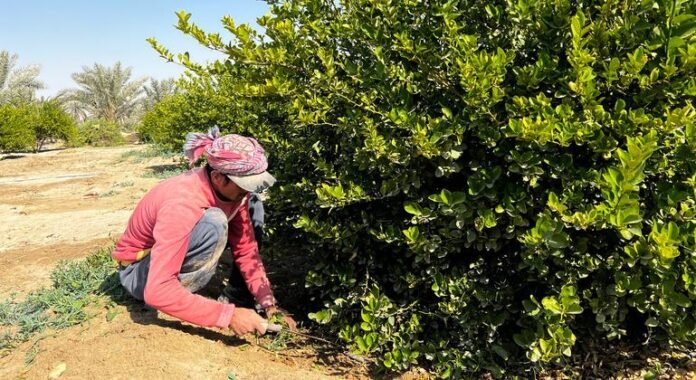Mohammad Alwanwairan stands in front of a green lemon tree, which is about to produce its first lemon crop after four months.
Alwanwairan, a businessman turned farmer, has been farming in Al-Ahsa, the eastern desert region of Saudi Arabia, for the past 15 years. Now, due to climate change and dwindling water supplies, they are adopting new technologies and new crops.
“We are very proud of our lemon farming in this region,” he told UN News, “When you touch them, you can smell the citrus oil on your hands. It brings back memories of our childhood.” opportunity to grow them commercially.”
Mohammad Alnawairan looks over his small farm in an oasis near the town of Hofuf. About 120 two-meter tall trees have been planted in the sandy soil of this farm of about 1,000 square meters, which have been growing for the past four years.
Efficient irrigation techniques
“On my left are the trees that have been irrigated using the new technology,” said Mohammad Alwanwairan, “and on the right are the trees that I have watered with my hands in the traditional way.” Plants irrigated with new technology grow better. either.”
The difference in their color, size and vigor is clearly visible, and the good health of these plants is mainly due to the irrigation system.
On the farm of Mohammad Alnwairan, efficient irrigation techniques are being tested. It is a resource-efficient way of growing crops, which is being promoted by the Food and Agriculture Organization of the United Nations (FAO) in the region.
For this, he checks the quality of the soil through an app on his smartphone and understands the water requirements of his lemon trees and supplies them as needed.
When it rains, the sensor detects wet conditions and stops the scheduled water supply. If the plants aren’t getting enough water, the app can order more water if needed – and all this can be done remotely, without even having to be there.

Water shortage
The agricultural lands of the oasis used to have plenty of water, but due to climate change the water table has dropped due to reduced rainfall and water intensive rice cultivation. This has made water availability more challenging and expensive.
Mohammad Alnwairan, who cultivates rice in another plot nearby, had to stop work when the water in his well dropped 300 meters.
“Efficient irrigation can reduce water consumption by up to 70 percent and is more sustainable for the environment,” said FAO irrigation expert Mahmoud Abdelnabi.
Generally, in countries like Saudi Arabia, it takes a lot of time and effort to provide water to fields during the scorching summer season. Currently, farmers do not have to pay for water supply, and due to automation, fewer workers are needed to water the plants, resulting in significant savings.
Although this is an advanced technology, it is readily available in the local market. This requires some financial investment, but according to FAO’s Mahmoud Abdelnabi, “it increases production and reduces labor costs, providing additional profits.”

Land degradation
Droughts are increasing in the desert region of Saudi Arabia due to climate change, causing farmers to face not only water shortages, but also desertification and loss of fertile land.
“Efficient irrigation is part of a holistic response to climate change, which also includes soil management and crop selection,” said Zafar Almubarak of the Saudi Irrigation Agency, FAO partner.
“By adopting this approach, not only can water be used optimally, it also helps in land reclamation and combating desertification,” he said.
About 40 percent of the world’s land has been degraded, with severe impacts on climate, biodiversity and human livelihoods.
Like other farmers around the world, Mohammad Alwanwairan is using his long experience and skills to increase his crop yields. It is driven by both need and opportunity.
“I am considering adopting efficient irrigation system for my entire farm and mainly focus on lemon farming for which I have a ready market,” he said.
If other farmers follow its lead, it will make more efficient use of water supplies in these arid regions and help prevent agricultural desertification.

